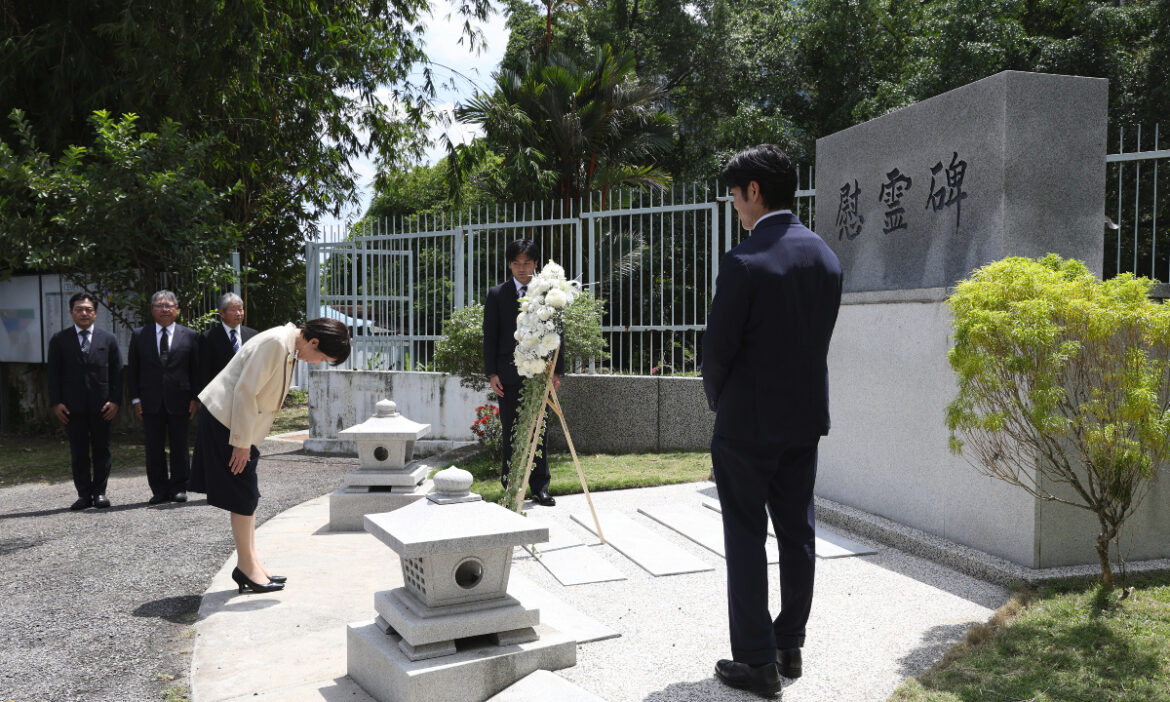
Japanese Prime Minister Sanae Takaichi visits the Kuala Lumpur Japanese Cemetery to offer flowers in Kuala Lumpur, Malaysia on October 26, 2025, drawing widespread criticism for neglecting the acts of aggression and atrocities committed by the Japanese military during World War II in Malaysia. Photo: VCG
During her visit to Malaysia in late October this year to attend the ASEAN Summit, Japanese Prime Minister Sanae Takaichi visited the Japanese Cemetery in Kuala Lumpur where Japanese soldiers in World War II were buried, and laid flowers at the Memorial Monument, which is to commemorate the Japanese soldiers. However, she made no mention of the atrocities committed by the Japanese military during its invasion of Malaysia, which sparked strong criticism in Malaysia, according to recent reports by media in Malaysia.
Takaichi visited the Japanese Cemetery in Kuala Lumpur on October 26 as part of her first international trip since taking office, during the ASEAN Summit, Malay Mail reported.
Takaichi, after visiting, wrote in Japanese on social media platform X that she was able to “commemorate our ancestors who lost their lives in Malaysia,” and felt “deeply moved” by the experience.
In the post and from her remarks, Takaichi neglected the acts of aggression and atrocities committed by the Japanese military during World War II in Malaysia, and it led to strong condemnation from Malaysia, despite that Japan’s Foreign Ministry claimed that Takaichi’s visit to the Japanese Cemetery in Kuala Lumpur was not a specific tribute to soldiers of the former Imperial Japanese Army.
The report said social media users were quick to question Takaichi’s actions, calling them ironic, as many soldiers and civilians were killed resisting Japan’s invasion of Malaya in 1941.
The report quoted a user by the name “Lucas The Black Walla”, saying that honoring Japanese soldiers without acknowledging the atrocities they committed in Malaya was profoundly offensive.
Another user, who went by the name “Malaysian IGOT7”, also wrote: “Have you as a country, ever publicly apologized for the invasion and occupation of Malaya, while inflicting sufferings and trauma to the people which some still carry to this very day(?)”
Takaichi’s actions have also sparked strong opposition from Malaysian scholars. They criticized the Japanese prime minister for choosing to pay tribute to the perpetrators in the face of history, undoubtedly hurting the sentiments of war victims and their descendants, the Xinhua News Agency reported.
Such words and deeds that deviate from historical facts are highly inappropriate, Xinhua reported, citing Malaysian scholars.
Danny Wong Tze Ken, Dean of the Faculty of Arts and Social Sciences at the University of Malaya, said that Takaichi holds an extremely conservative historical revisionist stance regarding the atrocities committed by the Japanese military in Asia during WWII, even overturning the historical recognition previously upheld by multiple Japanese leaders. “This is entirely unacceptable,” he said.
Julia Roknifard, a senior lecturer at Taylor’s University in Malaysia, said that “we see historical revisionism and attempts to deny historical truths as extremely dangerous.” Roknifard added that it is deeply regrettable that Japan’s political leadership is attempting to repackage and distort the history of WWII, Xinhua reported.
During Japan’s invasion and occupation of Malaya from 1941 to 1945, the Japanese Army carried out numerous acts of brutality against civilians, per the Star.
Among them were executions, rape and forced labor, especially targeting communities suspected of aiding anti-Japanese movements, according to the report.
Global Times


AloJapan.com